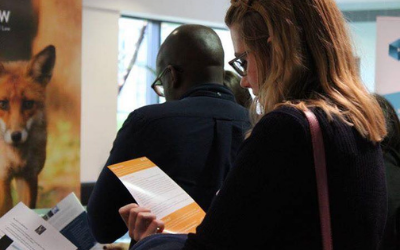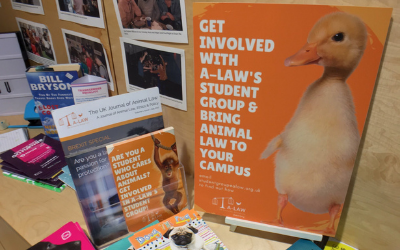Antoine Goetschel
Antoine Goetschel is an Animal Welfare Lawyer based in Switzerland.

Antoine Goetschel is an Animal Welfare Lawyer based in Switzerland. His most notable position was acting as Animal Advocate for the Canton of Zurich, although the role was abolished in 2011, Antoine continues to work as a consultant on animal welfare law around the world. Antoine has also written many books on the subject, including “The Animal in the Law – 99 Aspects of Human-Animal Relationship” and “The Dignity of Animals”.
Did you always know you wanted to be a lawyer?
These days, I am very happy to be a lawyer. I like to be creative and draft solutions within the existing law as well as amending it in favour of humans and animals. As a child and teenager I was more interested in languages and music. I’d rather wanted to study literature or music history. For family reasons, I decided early on to study a subject with better economic prospects and opportunities in business, consultation, and politics as well as in the areas of minorities or copyright.
When did you decide you wanted to practice in Animal Law?
As a student I was already very much interested in issues around minorities and fundamental rights. Just after my graduation in 1986 I got involved in animals in the law by coincidence and started to see this topic as a special protection area of minorities. I realised that animals outnumber people in this world significantly. The law, however, still limits their role and rights. After I had already written two books on animal protection in the law, I decided to write my dissertation about animal welfare. I especially looked at how animal welfare was restricted by the human economic, scientific, personal and religious freedom. So I started – along with specialized organisations – to care about the animal in civil law and their protection in criminal law. To give animals a voice has been at the centre of my heart for decades.
How did you get into Animal Law?
Towards the end of my legal studies, a fellow journalist and lawyer asked me to help him with a special assignment: the gathering of relevant legal texts in the Swiss Federal Law, dedicated to the animal. This resulted in a 715-page remission collection of the Swiss Animal Protection Law. However, the Animal Protection Law only formed a small part of this collection. Most of the texts were dealing with nature and environmental protection, even with hunting, the military, animal experiments and especially with the criminal and civil law, which facilitated compliance and application of the law before digitisation.
Following that, I was asked by an animal welfare organisation to write a legal commentary about the Swiss Animal Welfare Act from 1986. I quickly became the legal advisor of this animal welfare association and started working as lawyer for its president. During this time, I wrote my legal thesis on animal welfare and fundamental rights and was therefore very familiar with the matter. I even founded my own organisation, the Swiss Foundation For The Animal In The Law (www.tierimrecht.org) and headed it until 2007. Together we managed to build an extensive library and archive of all criminal cases against animals in Switzerland, published and commented on them – systematically and anonymously – on the internet.
Later I took a lecturer position at the University of Zurich and was appointed by the government as the “lawyer for animal protection in criminal matters of the Canton Zurich, Switzerland”.
As you can see, one event led to another. I believe the key was to remain true to my own principles until today. These days I get more and more involved in international consultancy work for the animal in the law and ethics. I am available to governments, animal welfare organisations, universities and the media as a guest speaker or special matter expert.
How much of your practice is Animal Law?
In the last years I have recognised an increasing interest in improving animal rights in other countries than Switzerland. Therefore, I am getting more and more involved in international discussions about animal rights and just recently returned from a one month lecture series in Australia, where I gave 12 lectures about the animal in the law in Australia as well as several media interviews. I also have been asked by Russia and New Zealand to make suggestions for law improvement. These days, I am not so much involved in particular cases anymore, but strive to help other countries to establish or improve their laws as well as law enforcement.
What is the rest of your practice?
I have always been keen to be a practicing lawyer. Through this I have gained valuable experience in dealing with courts, other lawyers as well as clients and got to know their concerns and needs. Only to be the CEO or president of an animal protection organisation was never enough to me. I rather consider this as a risk to become dependent and limited in your thoughts and actions. Therefore, I have been practicing since 1980 independently in the civil and public law, with emphasis on inheritance law, execution of wills, foundation, and association and media law.
What animal welfare cases are you most proud of?
Let me explain briefly. During my time as a legal adviser for an animal welfare organisation in Switzerland I submitted dozen of criminal complaints for violation of the Animal Welfare Act. However, we did not have an official status or the right to appeal in front of the court, which bothered me. Therefore, I started early to plead for complaint and appeal rights for animal welfare organisations in the Canton of Zurich. As a consequence, the position of the animal lawyer emerged. This official person had all the rights such as a legal representative of a damaged third party would have: access to documents, participation in interrogations, statements and appeal rights.
In my role as an animal lawyer between 2007 and 2010 I looked after 700 criminal cases against animals. I don’t think it is relevant to pick a few that were more important than others. More importantly is the fact that animals have their own legal status represented by a lawyer who takes animal welfare seriously. In the last twenty years, the number of cases reported increased dramatically in the Canton of Zurich as well as the degree of penalty, the motivation of the police, prosecutors and courts, to stand up for the animal and not just for animal owners.
I am happy to have contributed to protect the animal’s dignity in the Federal Constitution in 1992 and in the law in 2005. In Switzerland, animals are no longer “objects”, but a third category next to humans and objects. Several books on the matter and good media relationships improved the relationship between society and animals.
Do you enjoy the work?
I am always enthusiastic about prudent students and young lawyers who devote their warm heart and fresh mind to the animal in the law. I find it gratifying when the subject of the animal is taken seriously by a society and is publically discussed in a way that it is relevant and solution-oriented. I would exaggerate to say that I am happy to be confronted with criminal cases against animals and the abysmal depths of man on a daily basis, but if an animal abuser received an appropriate punishment, I feel content. On a bigger scale, contributing to justice makes me happy.
I currently enjoy talking to an audience that is interested in introducing animal laws. Based on my global comparison of the “animal in the law” of more than thirty countries, I am getting more and more involved in international discussions about animal rights. In this respect I experience deep joy in my work for the animal in the law and ethics.
How can a new lawyer steer their practice towards this area?
There are various paths for young lawyers. You may want to volunteer for animal welfare organisations and provide legal advice. This will help you to get a deeper understanding of the concerns and needs that actually arise in connection with the gaps in the law and its implementation. In cooperation with an open-minded animal welfare organisation or veterinary authority, courts and prosecutors, one can seek access to the complete records of the numerous animal welfare cases. These need to be systematised as part of a scientific work, evaluated and solutions need to be developed to avoid classic mistakes in the animal welfare law procedures. One can also get help by working together with the Swiss Foundation For The Animal In The Law ([email protected]) and profit from the extensive knowledge of experienced lawyers in this field.
What tips would you give to students who want to practice in this area?
Remain curious, ask critical questions and sometimes ask yourself while studying how different the protection of the animal is from that of the environment, and especially of children. If you also come to the conclusion that animals should be better protected, do some research in English literature on the animal in the law. Also study some German articles, especially in Swiss law and get in contact with the Swiss foundation for the animal in the law (www.tierimrecht.org). Influence your local animal welfare organisations and try to sharpen their awareness for legal aspects of animal protection. Apply for internships in these organisations that are open for legal aspects and attend international animal rights conferences, such as in Barcelona in 2014. When it comes to convincing and you have to deal with people who disagree, especially animal owners, use a tone of voice that leaves your conversational partner with dignity, in order to allow them the space to reflect. The conversation doesn’t have to revolve around animal protection issues necessarily, but rather concentrate on the improvement of the relationship between humans and animals in the criminal, administrative and civil law.
Why do you feel animal law is so important?
I believe that the responsibility to protect animals has to be taken by the society as a whole rather than leaving it to a number of animal welfare organisations. First of all, the awareness has to be raised and shifted from an “anti-cruelty” to a “pro dignity” society. It is not enough anymore for a group of people to fight another in order to convince them to stop animal abuse. It is more about rising as a society as a whole with high ethical values and making animal protection a federal duty. As Mahatma Ghandi once said: “The greatness of a nation and its moral progress can be judged by the way its animals are treated.” For me the attitude towards animals in the law defines how we treat minorities and even ourselves. It is like a mirror on how attentive we are towards ourselves, may it be with our food, dressing, sports, medication, zoo and circus visits or keeping pets.
Another aspect is food production. Looking at the forecast figures of prospective required meat in context of the rising population, especially in emerging markets, the plight of animals is more likely to rise. It should be a “yes” to the product, but a “no” to the production. Where animals are “produced” and “used” for financial benefits, such as in agriculture and medical sciences, strong ethical values and law enforcement are needed. Therefore, the protection of animals may well be regarded as an important parameter. Here, the law plays a crucial role, particularly the position of the animal as a separate legal category to protect their dignity and secure law enforcement.
What do you think the future holds for animal law?
I believe real progress in animal law can be made by looking at legal institutions that have been proven to be working and apply their principles to other legislations. I appreciate that more and more countries are waking up these days and move on from pure animal welfare towards the animal in civil, constitutional, criminal and procedural law. Also, I welcome an in depth analysis of areas in which the welfare rights are exacerbated and enforced for the benefit of animals. Generally I notice an increased interest in animal law at universities, conferences and in publications. I also want to thank you for your interest as a reader and spending your valuable time on animals in the law!
Follow Us !
WE NEED YOUR SUPPORT
We rely upon membership income and donations to carry out our work. Please join us or donate and support our work.
Become a Volunteer! If you like what we’re doing…
why not find out about the different ways you can get involved in our important work?






